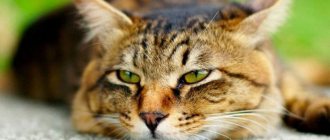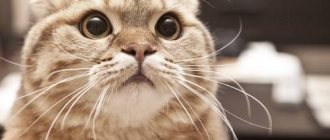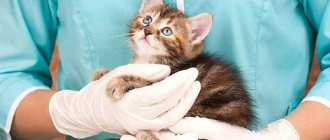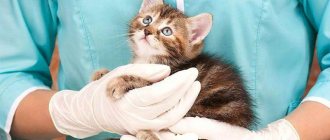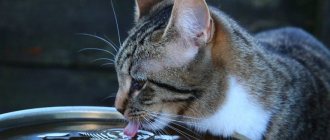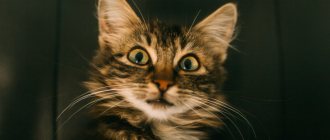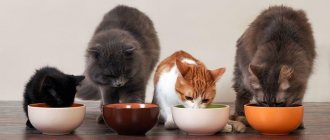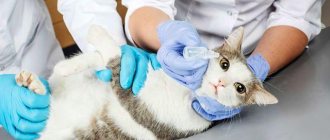(Be the first to vote!)
5589564
3 weeks ago owner reviews
A cat with little or no energy compared to their normal behavior is a lethargic cat. There are many different causes of lethargy in cats, and while lethargy can sometimes signal a behavior problem, most of the time it is your cat's way of telling you that she is sick.
- What is lethargy or lethargy?
- Cats can have varying degrees of lethargy
- Differences between a tired cat and a lethargic cat
- Causes of lethargy in cats Non-medical causes of lethargy
- Medical Causes of Lethargy in Cats
How does the condition manifest?
In cats, periods of increased activity are usually followed by apathy and drowsiness. It is difficult for owners to understand why and at what exact moments this happens. Therefore, a situation where a cat is lethargic, hardly eats and sleeps a lot, is alarming.
The owner should clearly know that poor appetite and less active behavior do not always indicate an animal illness. And the veterinarian is sometimes unable to understand why the cat is lethargic. The observations of an attentive and loving owner are extremely important here.
The main signs of cat health, in addition to good appetite and good spirits, are:
- shiny and smooth coat;
- pink and slightly moistened mucous membranes;
- cold and slightly damp nose (normally, during sleep it can become warm and dry);
- pulse, respiratory rate and temperature are within normal limits;
- absence of excessive discharge from the eyes, ears and nose, plaque in the mouth, salivation and unpleasant odor from the mouth and ears.
It is important! The normal duration of rest for a cat per day is 12-14 hours or more.
The cat is lethargic and sleeps all the time: what is the reason?
Among the pathological causes of lethargy are the following:
- poisoning,
- hormonal disorders after childbirth or as a result of using contraceptives,
- side effects of corticosteroid anti-inflammatory drugs,
- musculoskeletal pathologies,
- infectious diseases,
- worms;
- anemia;
- hypovitaminosis;
- tumors;
- chronic diseases.
Stress causes ambivalence in cats. The pet may become sleepy or, conversely, show aggression.
Possible causes of lethargy in healthy animals
Often there are reasons why a cat is lethargic, sleeps all the time and eats little, but it is better to understand each of them in order.
Stress
It is not uncommon for a cat to eat poorly and sleep a lot after a serious nervous shock.
Cats are very sensitive animals, so they have many causes of stress:
- travel by car;
- the arrival of a new family member or pet in the house;
- change of owner;
- repair or rearrangement of the house;
- visit to the veterinarian;
- change of place of residence by owners;
- lack of attention from the owner;
- pain;
- recent surgery;
- visit of guests;
- bathing and other hygiene procedures;
- changes in daily routine;
- the appearance of new and unusual objects in the house;
- first time on the street.
Usually cats cope with this situation quite well without medical help, but they really need the support of their beloved owner. However, in some particularly susceptible cats, stress lasts for quite a long time and can even be harmful to health.
The main physiological signs of nervous shock in a cat:
- urinary incontinence;
- rapid breathing;
- diarrhea or constipation;
- increased cleanliness (a cat can lick itself until bald spots appear on its fur and irritation on the skin);
- yawning too often;
- urinating in inappropriate places (the cat is marking its territory).
It is important! If, as a result of stress, the cat’s behavior does not return to normal for a long time, it is better to show the animal to a doctor. After all, nervous shocks can negatively affect his health and lead to the development of diabetes, skin diseases and disturbances in the functioning of the cardiovascular, digestive and genitourinary systems.
Change of feed
Often the cause of a lethargic state and refusal to eat is a change in diet (for example, switching from natural food to ready-made food and vice versa).
In this situation, you should return the cat to its previous food and treat it with some treat. Then the restoration of appetite and a cheerful state will occur very quickly.
Hot weather
Cats do not have sweat glands. They do not know how to cool themselves by opening their mouths, like dogs. Therefore, in the heat, to protect themselves from overheating, furry pets try to lie more in cool places. In addition, they begin to eat less so as not to waste energy on burning calories received with food.
Age
Over time, many owners begin to worry that their once active and nimble cat has become lethargic, eating almost nothing and lying around all the time. This is easy to explain: older cats no longer have as much energy for play; they sleep longer and more soundly than young animals.
If an elderly pet is lethargic, eats without appetite and sleeps a lot, but at the same time drinks water and has the above signs of a healthy cat, then there is no need to worry. However, an older cat should be regularly taken to the veterinarian for examinations to prevent the development of diseases.
Kittens spend almost 90% of the day sleeping until they reach two months of age. If the kitten is lethargic, plays little and eats poorly during periods of wakefulness, then the best solution is a trip to the veterinarian.
It is important! The maximum duration of healthy fasting for kittens is 1 day, for young cats and middle-aged pets – 3 days, and for “old people” – 2 days. If after this time the cat still does not start eating, you need to consult a doctor as soon as possible.
Pregnancy
In the early stages of pregnancy, many cats, like people, suffer from toxicosis. They become lethargic, try to move less and more carefully, sleep more and often refuse to feed.
If a cat was mated 3-4 weeks before this condition, then after another 5-6 weeks you can expect an addition to the cat family.
Signs of poor appetite
If an animal sometimes refuses to eat, then there is nothing wrong with that. You may not always notice weight loss right away. Cats that live indoors need less food. Therefore, they may sometimes not feel hungry and drink only water.
Loss of appetite may be a sign of serious problems
Veterinarians identify several thinness indices. When exhausted, the animal's ribs clearly appear; if you look at it from above, its figure will resemble an hourglass. The stomach is strongly retracted.
If the cat is underweight, the ribs and spine will be clearly palpable, and there will be no fat layer. With normal weight, the animal looks like an even rectangle from above. The ribs can be felt during normal examination, but a small amount of fat will be felt.
Important! Being overweight is just as dangerous as being underweight.
The owner should only start to worry if the cat is emaciated or underweight. In this case, it is better to consult a veterinarian to determine the cause of the weight loss.
Sometimes the condition is accompanied by additional symptoms - vomiting, drowsiness, lethargy. All this may indicate the development of a serious illness. A particularly dangerous sign is refusal of water.
Possible pathological conditions
If the cat has been lethargic for several days, sleeps a lot, drinks and eats poorly, and can barely walk, the owner should under no circumstances let the situation take its course. Such a condition in the pet’s body most likely signals the development of a serious disease. The cat must be shown to a doctor in the next few hours.
Anemia
Anemia occurs when a cat's body produces less red blood cells and hemoglobin.
In addition to the fact that with anemia, a cat is lethargic and sad, it also exhibits other signs of this unpleasant disease:
- the nose becomes lighter;
- mucous membranes acquire a bluish tint;
- blood pressure decreases;
- the pulse is sometimes rapid, sometimes rare;
- breathing accelerates, shortness of breath appears;
- the fur becomes dull and may fall out;
- clear discharge appears from the nose.
Diseases of the cardiovascular system
If the cat eats poorly and constantly sleeps, is lethargic, tries to walk less - these may be signs of the development of a disease of the cardiovascular system.
Your pet may be bothered by fluctuations in blood pressure.
It is important! Normally, blood pressure in cats can “jump” from 105/65 to 135/95 mmHg.
With high blood pressure, furry couch potatoes experience:
- lethargy;
- decreased vision (while moving, the cat may bump into furniture and other objects);
- rapid pulse;
- dilated pupils;
- redness of the eyes;
- sometimes vomiting;
- in some cases - nosebleeds.
With low blood pressure, the pet refuses to eat due to nausea, sleeps a lot, its pulse slows down, and the cat may even lose consciousness.
In acute heart failure, the animal is also lethargic, its breathing becomes difficult, shortness of breath and bluish discharge from the nose appear.
An important symptom of the development of heart disease in a cat is its characteristic posture in a relaxed state. She usually stands with her front legs spread wide. This makes it easier for her to breathe.
Gastrointestinal diseases
Often the cause of a pet's lethargic and sleepy state and his refusal to eat are diseases of the gastrointestinal tract.
With gastrointestinal pathologies, a cat may exhibit symptoms:
- bloating;
- stools that are very dark, almost black, or mixed with blood and mucus;
- belching;
- constipation;
- flatulence.
Diseases of the urinary system
The development of urinary system diseases in cats, in addition to a lethargic state and lack of appetite, is accompanied by symptoms:
- too frequent or infrequent urination, or its complete absence;
- constant pain when urinating;
- the appearance of blood or pus in the urine;
- sweetish smell from the mouth;
- lower back pain;
- extremely unpleasant odor of urine.
To reduce pain at least a little, the animal lies down almost all the time, does not drink or eat.
It is important! If your pet has a blockage in the urethra, without medical attention he may die within 3 days.
Infectious diseases
In many cases, a cat’s lethargic behavior, refusal to feed and staying in almost constant sleep indicate an infectious disease.
Such diseases are extremely dangerous for cats and require immediate medical attention. The owner must remember that the life of his pet is literally counted in minutes.
The most dangerous infectious diseases that cause cats to become very lethargic are:
- Leptospirosis: Caused by the bacterium Leptospira. The disease affects almost all cat organs and is very dangerous for humans;
- Calcivirosis is a viral disease that affects the respiratory tract. It occurs mainly in cats under 2 years of age, but sometimes in older individuals;
- FIV is feline viral immunodeficiency: an extremely dangerous disease that affects the immune and nervous systems. Only representatives of the cat family, including wild representatives, can become infected with it;
- Panleukopenia (popularly called feline distemper) is a deadly disease that develops very quickly. It affects the cardiovascular, digestive and respiratory systems of the cat and is accompanied by intoxication of the entire body;
- herpes virus infection (another name is rhinotracheitis): caused by the feline herpes virus. Affects the respiratory and visual organs. If the animal is weakened by other diseases and does not receive proper treatment, the infection can lead to death.
The main signs of a cat becoming infected with a dangerous infection:
- lethargy and apathy;
- lack of appetite;
- high body temperature (above 40°C);
It is important! Normal body temperature in adult cats is 38-39°C, in small kittens – 38-39.6°C, in sphinxes – 38-41.5°C.
- labored breathing;
- cough and wheezing;
- vomit;
- foul, greenish diarrhea;
- bloody discharge from the mouth, nose, ears, eyes;
- soreness in some parts of the body.
Intoxication
Poisoning of the body (intoxication) in cats, in addition to lethargy and refusal to eat, is indicated by:
- diarrhea;
- vomit;
- increased salivation;
- increase or decrease in body temperature;
- redness or blueness of mucous membranes;
- constant feeling of thirst;
- convulsions and so on.
If you suspect poisoning, you should try to induce vomiting in the cat so that the body can at least partially get rid of toxins, and then take it to the veterinarian.
However, if more than 2.5 hours have passed since the poisoning, it is better to transport the pet to a veterinary hospital as soon as possible. After all, during this time, toxic substances have already spread throughout the circulatory system throughout the body.
In order to protect your furry pets from intoxication, you need to know its main causes:
- stale or poor quality food;
- contaminated drinking water;
- bites of snakes and poisonous insects;
- helminth infection;
- bacterial and viral infections;
- violation of hygiene rules when keeping animals;
- eating poisonous plants, fertilizers, chemicals;
- uncontrolled use of medications;
- individual intolerance to certain components of feed, hygiene products, etc.;
- exposure to toxic fumes from paint and varnish products.
Parasites
The cause of lethargic behavior and drowsiness can be a cat’s infection with external and internal parasites (fleas, ticks, worms).
Flea and tick bites cause itching and pain in cats. As a result, due to constant scratching, wounds appear on the skin, and the hair begins to fall out.
A cat with ear mites often shakes its head and scratches its ears, in which a lot of wax with an unpleasant odor can be found.
Cats infected with worms are often lethargic. Other signs of the disease:
- bowel disorder (diarrhea or constipation);
- vomit;
- itching and irritation in the anal area;
- temperature increase;
- bloating;
- the presence of eggs and particles of worms in the feces.
If external or internal parasites are detected in your pet, you need to begin exterminating them as soon as possible. The veterinarian will prescribe the medications.
The fight against parasites is very important, because they are quickly transmitted to both other animals and humans.
If the cat is lethargic, does not eat or drink: what to do?
If the animal does not eat or drink, then there is a reason that causes vomiting. If toxic substances appear in the gastrointestinal tract, the body gets rid of them, first of all, through diarrhea and vomiting. This scenario develops in case of poisoning or infectious diseases.
When the intestinal lumen is clogged with bones, hairballs, and helminth balls, there is only one way to get rid of poisons - through the mouth. An attempt to eat or drink something is stopped reflexively and vomiting occurs. Therefore, food and water intake is stopped.
When your pet is not eating or drinking and an appointment with the veterinarian is postponed, it is necessary to protect him from dehydration. The owner of the cat is able to independently inject him with Ringer-Locke solution or saline solution subcutaneously in unlimited quantities. Use syringes of 5 or 10 ml. After the injection, an accumulation of fluid is formed, which quickly resolves. Water should not be used for injection, it causes pain.
You should not treat your cat yourself. There is a high risk of compromising health and creating problems for the veterinarian during diagnosis.
Other pathologies
In addition to the listed pathological conditions of cats, accompanied by lethargy, drowsiness and loss of appetite, the following painful conditions also occur:
- disturbances in the functioning of the endocrine system.
For example, after sterilization or childbirth due to hormonal imbalance, cats become lethargic and inactive.
Pets suffering from diabetes also do not want to move too much. In addition, such cats are constantly thirsty, eat a lot or very little, and often go to the toilet. They experience weight fluctuations, their vision deteriorates, their stomach enlarges, their muscles weaken;
- oncological diseases.
One of their symptoms in cats is a lethargic state. Changes in the pet’s well-being are clearly visible: the cat hardly eats, lies down all the time, vomits, and experiences internal bleeding. Such animals have very unpleasant breath, and upon visual examination, swelling and ulcers can be detected on the body;
- diseases of the musculoskeletal system.
Even an inexperienced owner can easily recognize them. With arthritis, dislocations, sprains, osteochondrosis, fractures and other problems, animals become lethargic, try to eat and move less. Cats' affected joints swell, they limp, rarely sharpen their claws and wash themselves. All movements cause them pain;
- complications after surgery.
Usually, in the first three days after the intervention, cats are very lethargic. This condition, in the presence of appetite and thirst, is considered normal.
But, if the animal’s temperature rises, blood or pus begins to ooze from the wound, vomiting or constipation often occurs - you need to contact the clinic as soon as possible. After all, these can be dangerous symptoms of suture dehiscence or suppuration, or the formation of a hernia.
Symptomatic treatment
If the animal behaves apathetically for a short time, treatment is most often not required. You need to watch your pet and not bother him. When the condition returns to normal, the cat itself will replenish lost energy and emotions.
But if the owner is worried, you can take the animal to the clinic. The specialist will examine the animal and, if nothing dangerous is found, will release it home.
If the animal is apathetic for more than a day, there are no apparent reasons for this, and the condition worsens, you need to consult a doctor.
If, against the background of apathy, the animal has no appetite and does not drink, at the diagnostic stage it needs maintenance therapy. Typically these are glucose injections or infusions with solutions that replenish fluid loss and maintain electrolyte balance in the animal’s body. Treatment will depend on the diagnostic results.
You should not diagnose your animal yourself, much less give medications.
Dangerous symptoms
A kitten that sleeps a lot, does not like to play active games, eats poorly and eats little, may be seriously ill. Pay attention to your pet and the presence of other pathological symptoms. Signs of the disease:
- dry and hot nose;
- refuses to drink;
- temperature, body tremors;
- loose stools;
- vomit;
- pallor of mucous membranes;
- dull coat;
- impaired coordination;
- giving up your favorite treats;
- lack of reaction to people, loud sounds, lights;
- dilated pupils;
- rapid breathing.
Any of the listed symptoms is considered a deviation from the norm. To understand why your pet has stopped playing, eating and drinking, you need to consult a veterinarian.
If you know that the cause of poor health is poisoning, rinse the kitten’s stomach and give activated charcoal. After these steps, go to the veterinary clinic.
If the cat sleeps a lot and is lethargic: when this is due to natural reasons (after sterilization, castration or with the onset of winter); what to do if she becomes lethargic for no reason; what diseases are accompanied by drowsiness.
Diagnostics
The main difficulty in identifying the cause of weight loss is that it can be a sign of various disorders. Therefore, an in-person consultation with a veterinarian and a detailed examination is necessary.
In order to make an accurate diagnosis, tests are taken
It is imperative to undergo tests, since only they allow you to present a complete picture of the disease. In order to understand why a cat is losing weight, a general and biochemical blood test is prescribed, urine and feces are studied. Already these data will give an idea of the work of internal organs.
It is advisable to take an x-ray of the abdomen and chest. Treatment is prescribed only after the exact cause of weight loss has been established. If the animal has a small amount of fur accumulated, then a special paste is sufficient.
If an inflammatory process is detected in the mouth, it is recommended to clean the tartar and use healing ointments. This hygiene procedure should be done once a year.
The most difficult thing is to correct hormonal disorders. During heat, the animal behaves inappropriately and this cannot be changed in any way. Light sedatives will not completely eliminate sexual desire. Therefore, it is better to castrate and sterilize non-breeding animals.
Important! The operation is completely safe for pets and improves their quality of life.
The heat does not always occur in the spring. In some animals it occurs at any time of the year. Sterilization helps protect your cat from developing mammary cancer. Castration of males is not so traumatic and allows you to wean the cat from marking its territory.
A cat may be thin due to worms. In this case, a course of special medications is sufficient. They should only be prescribed by a doctor, since the type of parasites and the degree of infestation matter.
Serious diseases are the most difficult to treat. In oncology, much depends on the size of the tumor and its location. In some cases, surgery can extend the life of a pet.
The earlier the problem is identified, the greater the chances of its successful treatment.
Bacterial infections are treated with a course of antibiotics, viral diseases with supportive medications. If a cat has discharge from the eyes, the owner should clean them regularly.
In addition to treatment, it is important to create special conditions for the pet’s recovery. To do this, they will organize a quiet and peaceful place for him to relax. The cat is allowed to sleep as much as he wants. During the treatment period, he is provided with nutritious, high-quality nutrition.
Popular brands of food have special dietary lines that allow you to provide the animal with all the necessary vitamins and minerals.
Important! If a cat's teeth fall out, it is provided with soft food during this period. Pates or baby meat puree are suitable.

